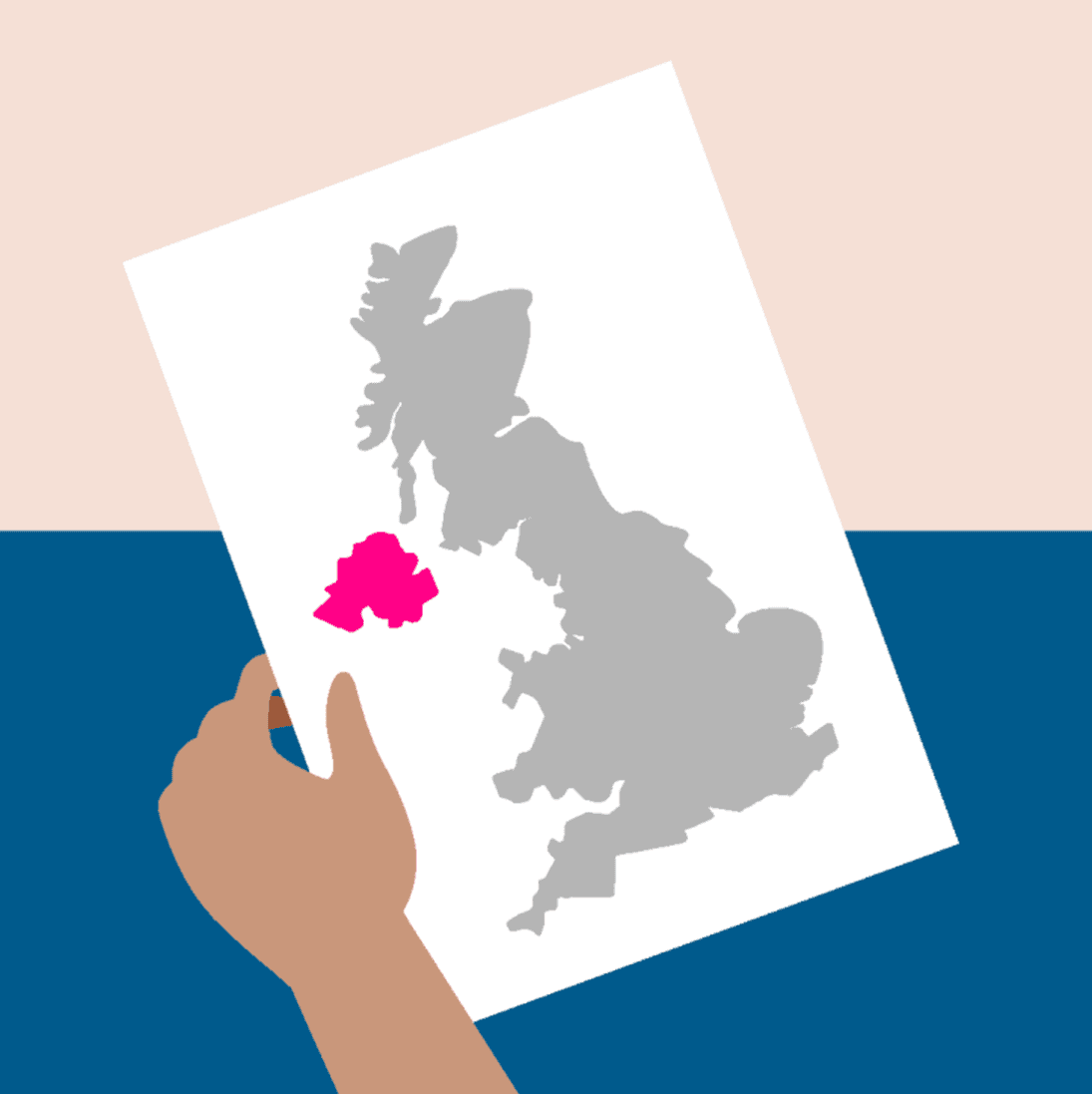

Too many cancer patients are waiting too long for diagnosis and treatment in Northern Ireland. We’re calling on the NI Executive to develop a crisis response and stabilisation plan for cancer, to eliminate unnecessary risks of harm from delays.
We spent around £2m in 2023/24
Cancer deaths have fallen by around 5 in 100 in the last 10 years.
Around two-thirds (65%) of adults are overweight or obese.
Around 10,300 people are diagnosed with cancer each year.
Almost 6 in 10 (54.9%) of cancers with a known stage are diagnosed early.
A fifth (20.4%) of children are overweight or obese.
Around 4,600 people die from cancer each year.
Around 3 in 20 (14%) of adults smoke.
Almost 6 in 10 (57.85%) of people aged 60-74 have taken part in bowel screening.
In Northern Ireland around 10,300 people are diagnosed with cancer each year – more than 28 people every day – and around 4,600 people die from it. Since the early 1990’s cancer incidence rates in Northern Ireland have increased by 12% and this is set to continue with cancer incidence predicted to increase to more than 14,000 diagnoses a year by 2038-2040. Although cancer survival is improving, with 57% of patients surviving for five years or more, survival in Northern Ireland still lags behind other comparable countries around the world.
Each year Cancer Research UK spends around £2 million in Northern Ireland on some of the UK’s leading scientific and clinical research. More progress is necessary as one in two people in the UK will be diagnosed with some form of cancer during their lifetime.
Health is a devolved matter in Northern Ireland. This means decisions for NI are made locally. We work closely with the Department of Health, Public Health Agency, Northern Ireland Cancer Network and Health and Social Care Trusts to help make cancer services the best they can be, and we engage with the Northern Ireland Executive and members of the NI Assembly to keep cancer high on the political agenda.
2019: Influenced the decision by the Public Health Agency to change the test for bowel cancer screening programme to FIT and to change to the HPV test in for cervical screening.
2020: Significant participation in the development of the new 10- year Cancer Strategy for Northern Ireland, working as part of the strategy’s core steering group, chairing the sub-group on cancer diagnosis and screening, and making sure cancer patients voices were heard.
2022: Significant participation in the development and roll out of the first two Rapid Diagnostic Centres (RDCs) in Northern Ireland. Based at Whiteabbey and South Tyrone Hospitals, they provide a much-needed vague symptom referral pathway. We continue to be an active member of the RDC strategic oversight group.
2023: On- going and active participation in the Cancer Strategy Programme Board , including working on the development of a cancer research strategy for Northern Ireland.
2022-2025: Developed and ran two mass media Be Cancer Aware programmes to raise public awareness of the signs and symptoms of cancer and one further campaign to encourage more people in Northern Ireland to take part in screening programmes when invited. All three campaigns were run in partnership with the Public Health Agency.
£2 million invested in cancer every year.
17 CRUK shops across Northern Ireland.
29 local fundraising groups and supporters raise around £470k every year.
We raise around £600k every year through supporter events and corporate partners.
Media volunteers are at the heart of helping Cancer Research UK raise awareness of our work in Northern Ireland. By sharing personal experiences, our volunteers also inspire others to support us. If you have a cancer experience and would feel comfortable with details appearing in a newspaper, online, radio, TV, magazines or on social media then we’d be grateful if you could complete our Share Your Story form.
Everyone’s story is important. By becoming a media volunteer, you can:
help highlight the experiences of real people affected by cancer.
raise awareness of symptoms and help with cancer prevention.
give inspiration and hope to other people affected by cancer.
inspire others to fundraise for Cancer Research UK.
Once you have filled out the form, your details will be stored on a secure database. We won’t share any of your details without your permission and a member of experienced staff will contact you directly if a suitable media opportunity arises.
Campaigns Ambassadors play a critical role in our mission to beat cancer sooner. They save lives by persuading politicians to support cancer research, prevention, early diagnosis and access to treatments. You can be part of a determined group that have made significant changes to the nation’s health. Our successes have included:
Securing the introduction of plain tobacco packing
Bringing in laws to protect young people from sunbeds.
Ending smoking in enclosed work and public places.
This is a flexible, home-based volunteering role, which can fit around your current commitments.
Become an Ambassador todayUK Cancer Mortality by Deprivation (February 2025) (PDF, 300 KB)
Cancer in the UK: Northern Ireland Overview 2024 (PDF, 1.15 MB)
Cancer Clinical Research in Northern Ireland - Full Report (February 2023) (PDF, 182 KB)
Cancer Clinical Research in Northern Ireland - Executive Summary (February 2023)(PDF, 828 KB)
Northern Ireland Cancer Strategy March 22 Department of Health(PDF, 773 KB)
CRUK policy position paper: the diagnostic workforce in Northern Ireland (July 2019)(PDF, 5.46 MB)
Bench to Bedside: Enhancing the Competitiveness of Medical Research in Northern Ireland (April 2019) – Full Report(PDF, 1.04 MB)
If you'd like to find out more about our priorities in Northern Ireland, please get in touch. We’re keen to work with MLAs to keep cancer on the agenda.
Email: NorthernIrelandPA@cancer.org.uk
If you're interested in making a donation to support research in Northern Ireland, call 0300 123 1022 or email supporter.services@cancer.org.uk (please don’t send funds direct to our research centres).
News, updates and opinion, posted weekly.
Get in touch.